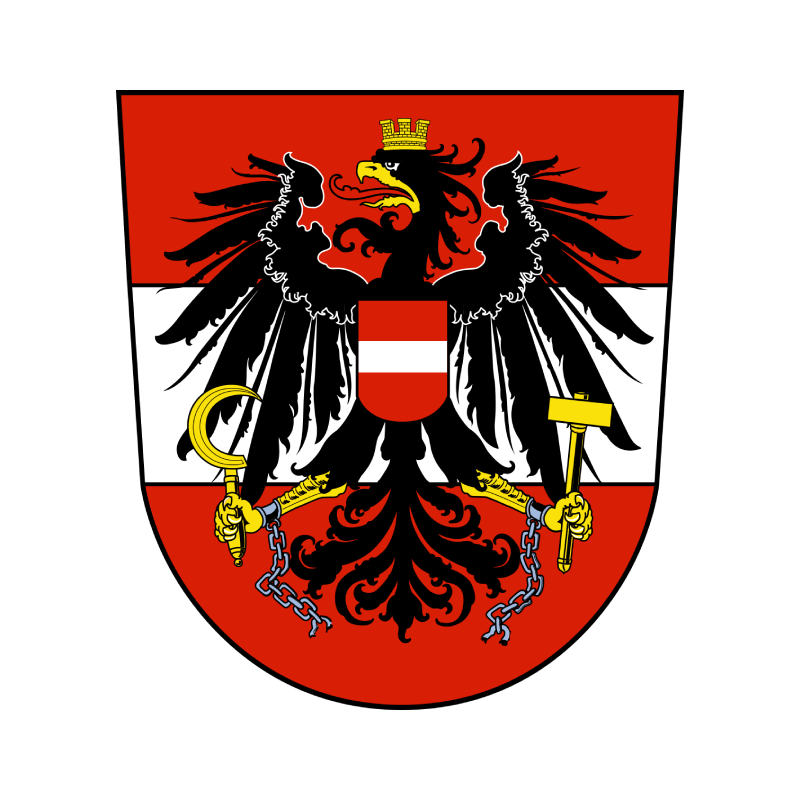Austria

National Team Information
General Info
UEFA
Das Team (The Team), Burschen (The Boys), Unsere Burschen (Our Boys)
Austrian National Football Team History
Beginnings: First-Ever Match
Austria played their first-ever match in 1902, which ended in a 5-0 win over Hungary. The Austrian Football Association, or ÖFB, was founded two years later. In the 1930s, Austria had one of the strongest teams in Europe. In their first World Cup appearance, in 1934, Austria finished in fourth place. Mathias Sindelar was one of the best players of the era for “Das Team.”
1936 Olympics History
In the 1936 Olympics, Austria won the silver medal in controversial circumstances. They were beaten by Peru in the quarterfinals, but Peru “withdrew from the tournament.” It was later discovered that Adolf Hitler intervened on the Austrians’ behalf to annul Peru’s victory.
1938 - 1954
When Germany annexed Austria, in 1938, Austria were forced to withdraw from the World Cup. Instead, only a team made up of German players took part in the tournament that year. Upon gaining independence again after WWII, Austria had their best-ever finish at the 1954 World Cup. They finished in third place but were disappointed four years later.
Austria’s first failure to qualify for the World Cup was in 1966, and they missed out in 1970 and 1974 as well. Despite failing to get out of the group in 1978, they managed a signature 3-2 win over Germany. Hans Krankl scored a double in the match, which is now referred to as the “Miracle of Cordoba.” Four years later, Austria was involved in another group stage match with Germany. It’s often called one of the most disgraceful matches in soccer history: The Disgrace of Gijón. The match grinded to a halt after Germany scored because both teams would go through to the knockout stage if the Germans won by a single goal. The match was the catalyst for having final games within a World Cup group be played at the same time.
1990 - 2000
In 1990, Austria were eliminated in the first round of the World Cup and also lost to the Faroe Islands in Euro ‘92 qualifiers. It was considered one of the biggest upsets in soccer history at the time. Austria did qualify for the 1998 World Cup but only managed to finish third in their group. After a period of decline in the 2000s, Austria qualified for both Euro 2016 and Euro 2020.
Austria soccer betting was an unprofitable venture in the recent 2022 UEFA Nations League. With just a 1-4-1 record, Austria finished in last place in their group and were relegated to the Nations League B.
- Anton “Toni” Polster – Goals: 44
- Johann “Hans” Krankl – Goals: 34
- Marko Arnautovic – Goals: 33
- Johann Horvath – Goals: 29
- Erich Hof, Marc Janko –Goals: 28
- Toni Polster – Anton “Toni” Polster is the Austria National Team’s all-time leading goal scorer, with 44 goals. He won the European Golden Shoe in the 1986-87 season and was the Austrian Bundesliga top scorer on three occasions.
- David Alaba – Perhaps the most decorated player in Austrian history, David Alaba is a ten-time German Bundesliga champion. He has also won the Champions League with Bayern Munich and Real Madrid. The versatile left-footed player has been the Austrian Footballer of the Year a record eight times.
- Hans Krankl – While playing as a striker for Barcelona, Hans Krankl came in second in the Ballon D’or voting in 1978. He was the top scorer in La Liga in 1978-79 and also scored 34 times for Austria. He’s often regarded as one of the best Austrian soccer players of all time.
- Herbert Prohaska – A talented midfielder, Herbert Prohaska won the Austrian Bundesliga seven times with Austria Vienna. He also had successful stints in Italy with Inter Milan and A.S. Roma. Prohaska later went on to win the Austrian Bundesliga twice as the coach of Austria Vienna.
- Josef Bican – With over 950 career goals, Josef Bican was the second-most prolific striker in history. Incredibly, Bican scored over 425 goals for Sparta Prague in just 221 league matches. Bican played in the 1934 World Cup for Austria and later played on the Czechoslovakian and Bohemian National teams.
Austria’s best performance at a World Cup was in 1954. They kept two shutouts in two group stage matches, against both Scotland and Czechoslovakia. Austria demolished Czechoslovakia, 5-0 as Erich Probst scored a hat trick. In a wild quarterfinals matchup, Austria defeated neighboring Switzerland, 7-5. In their second-ever semifinals appearance, they fell 6-1 to eventual winners Germany. Austria defeated Uruguay 3-1 in the third-place game for their best-ever World Cup finish.
Four years later, Austria failed to reach the same heights. In the 1958 World Cup, they were in an incredibly challenging group with Brazil, the Soviet Union and England. With two losses and a draw, Austria finished at the bottom of the group and 15th out of 16 teams.

Austria Soccer Leagues & Clubs:
Austrian Football Bundesliga:
The Austrian Bundesliga is the top Austrian soccer league and consists of 12 clubs. It follows a double round-robin format from July to March, with a winter break built in. Then, the league splits in half into a relegation and championship round. The top six teams play each other, home and away, to determine a champion.
Meanwhile, the bottom six teams also play each other twice and the last-place team is relegated. The Austrian Bundesliga has existed since the 1974-75 season, and Red Bull Salzburg have the most titles in the Bundesliga era, with 16. As of 2022, RB Salzburg have won the last nine Austrian Bundesliga titles. However, Rapid Wien have been champions of Austria a record 32 times.
Austrian Football Bundesliga Clubs 2022-23:
| Team |
|---|
| FC Red Bull Salzburg |
| SK Sturm Graz |
| LASK Linz |
| Austria Klagenfurt |
| Austria Wien |
| Wolfsberg |
| SK Rapid Wien |
| Austria Lustenau |
| WSG Tirol |
| Hartberg |
| Altach |
| Ried |
Austrian Football Second League:
The Austrian Football Second League is the second-tier Austrian league, as the name implies.
There are 16 clubs and the league follows a double round-robin format with no playoffs. Only the champion is promoted to the Austrian Bundesliga. Meanwhile, the bottom three teams are relegated to the regional Austrian leagues at the end of each season.
Austrian Football Second League Clubs 2022-23:
| Team |
|---|
| Admira Wacker |
| SKU Amstetten |
| Austria Wien II |
| Blau-Weiß Linz |
| FC Dornbirn |
| First Vienna FC |
| Floridsdorfer AC |
| Grazer AK |
| SV Horn |
| Kapfenberger SV |
| SV Lafnitz |
| Liefering |
| Rapid Wien II |
| Sturm Graz II |
| St. Pölten |
| Vorwärts Steyr |
Austria Cups & Tournaments
The Austrian, or ÖFB, Cup is a domestic single-elimination tournament open to most Austria soccer teams. The Austrian Cup is entering its 92nd edition in 2022-23.
The tournament confers a place in the Europa League playoffs to the winner. In recent years, RB Salzburg have dominated the tournament. As of 2022, they’ve won eight of the last nine editions of the competition. Despite RB Salzburg’s recent dominance, Austria Wien have won the Austrian Cup a record 27 times.
From 1986 to 2004, the winners of the Austrian Bundesliga and Austrian Cup would contest the Austrian Super Cup. The Super Cup has since been discontinued, and Austria Wien won the trophy a record six times.
Austria Soccer Betting Information
Betting on the Bundesliga
The Austrian Bundesliga has a short regular season which has a few implications. With just 22 matches, every match is highly important. A three or even five-game losing streak can be overcome in a 38-game season. However, it could prove to be fatal to a team in the Austrian Bundesliga. It may be worth placing less weight on trends in the Austrian Bundesliga than in a league with more matches.
Austria soccer betting has been all about RB Salzburg over the past few years. They have become the dominant force in Austrian soccer, and it’s a surprise when they don’t win trophies at this point. With all that success, they’ve become regular participants in the Champions League group stage.
Often, they’ll field a stronger lineup for a midweek UCL match than their weekend Austrian Bundesliga match. So, that could present betting opportunities for punters.
Even though there are only 12 teams, there’s typically a big gap in quality between the top few teams and the rest of the league. Moneylines may not offer the best value in these matches, so spread betting can be a good option. Also note that blowouts are more common in the regular season than in the championship and relegation rounds.
Austria National Team Betting Tips & Odds
The next major betting opportunity for Austria is in the 2024 Euro qualifiers, which start in the Summer 2023
The Austrian National team’s performances have been inconsistent over the last few years. That means Austria soccer betting has been quite a risky proposition. Austria did well to make the round of 16 in Euro 2020 and take Italy to extra time. However, they followed it up by finishing in fourth place in their World Cup Qualifying group.
Then, in the 2022 UEFA Nations League, Austria picked up a signature victory over Croatia in their first match. The success was short-lived, as they failed to win another match and got relegated to the Nations League B. Austria sometimes shows promise, but they often fail to string together good results. With an aging core, Ralf Rangnick will be tasked with calling up younger talents. Betting tips suggest being cautious when picking Austria.
Austria have often lacked a prolific striker, but the hope is that Sasa Kalajdzic becomes that guy. The next major betting opportunity for Austria is in the 2024 Euro qualifiers, which start in the Summer 2023. It wouldn’t be a surprise at all if Austria do qualify, as the top two teams in each group make it through. Their group also comprises Belgium, Sweden, Estonia and Azerbaijan.
Conclusion
The Austrian Bundesliga may not rank among Europe’s best leagues, but it is rising in profile. RB Salzburg, in particular, has certainly put the league on the map. Some of soccer’s best talents in recent years, like Erling Haaland and Sadio Mane, spent time in the league. Given its status as a developmental league, it can be interesting to watch and bet on.
The Austrian National team has had some good periods in their history but have been waiting over 20 years to qualify for another World Cup. There have been some promising signs for them, but inconsistency is the norm rather than the exception. Keep that in mind when betting on Das Team.















